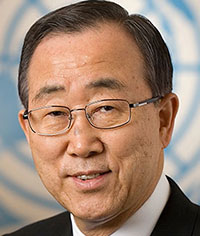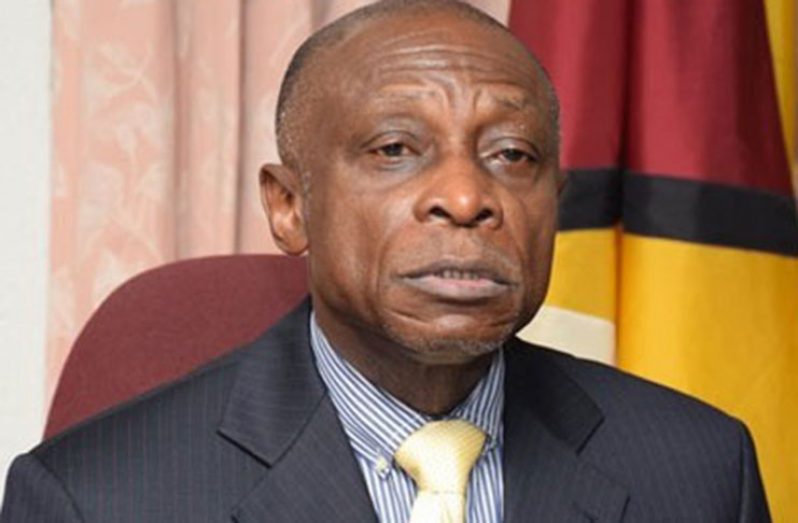–for UN assessment of Guyana/Venezuela border controversy
GUYANA’s Minister of Foreign Affairs, Carl Greenidge, believes that December is a more realistic time for outgoing United Nations (UN) Secretary General, His Excellency Mr. Ban Ki-

moon, to make an assessment of the Guyana/Venezuela border controversy; and not the end of November, as he had indicated to President David Granger.
Minister Greenidge is of the opinion that that assessment would be completed before the end of December.
Guyana had approached the outgoing Secretary General of the United Nations to act in accordance with his obligations under the Geneva Agreement — to choose another means of settling the border controversy between the two countries, in accordance with Article 33 of the UN Charter; and Mr. Ban had indicated that he would recommend the way forward before he demits office on December 31.
Guyana has expressed much optimism that the border controversy would be sent to the International Court of Justice (ICJ) before Mr. Ban demits office.
“(Mr.) Ban Ki-moon (has) committed himself to a set of processes. November was mentioned in the context of stocktaking, and after that, he undertook to hand down his decision. I wouldn’t hold my breath for (his assessment coming at) the end of November,” Minister Greenidge told reporters on Saturday.
“My understanding is that (Mr. Ban’s) decision (would) be announced before he leaves office, and so we are looking well into December,” the Foreign Affairs Minister said, just one day after returning from meeting with the UN Secretary General.
While in Morocco on November 18, President Granger had said he was optimistic that the outgoing UN Secretary General would hold to his commitment to give an “assessment” of the next step to be taken in the border controversy, and refer same to the ICJ for a final ruling.
Should the UN Secretary General decide to refer this border controversy to the International Court of Justice (ICJ), it would bring an end to the controversy that has deeply affected Guyana’s development for 50 years.
“We have to hold Mr. Ban Ki-moon to his own word. The word he used was ‘assessment’. November is quickly passing, so we expect Mr. Ban Ki-moon to quickly fulfill his obligation to let us have an assessment,” President Granger has stated.
However, President Granger said, should Mr. Ban fail to act as indicated, incoming UN Secretary-General, His Excellency Mr. Antonio Guterres, would be the person to chart the course.
“Of course (Mr. Ban) is demitting office, and Mr. Guterres is going to be the person to make decisions; and of course you know Guyana has (taken) a stand that, (after) 50 years of talking, we need to go to the Court (International Court of Justice) and have this matter settled. This is what we expect. I won’t use the word hope; it is not a planning strategy. We have done our homework, relayed our case before the international community, and Mr. Ban Ki-moon is quite aware of the power he has — and Mr. Guterres, (as do) all Secretaries-General of the UN — under the Geneva Agreement,” the President said.
Guyana is restricted from taking action outside of the Geneva Agreement, and has exhausted all other courses. Since taking office in May 2015, the David Granger-led Administration has had to mount international protests against a series of acts of aggression by Venezuela.
This Spanish-speaking country has claimed Guyana’s maritime space following the announcement by U.S. oil giant ExxonMobil of a “significant” oil discovery there. After threatening the company, Venezuelan President Nicolás Maduro issued a decree, on May 26, 2015, seeking to extend Venezuela’s land claim to also annex Guyana’s maritime space.
Venezuela had, in 2013, sent one of its navy’s vessels into Guyana’s waters to seize a U.S-chartered oil survey ship and escort it to Margarita Island. Also, in September 2015, Guyanese authorities had announced that the Venezuela army had travelled up the Cuyuni River.
Venezuela has consistently claimed that the 1899 Arbitral Award which settled the countries’ borders is null and void, but Guyana has rejected outright the claims by Venezuela, and has insisted that the only solution to the border controversy is by way of juridical settlement, and not by threats.


.jpg)











